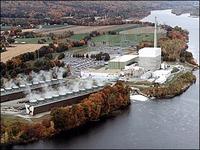-
Simple solution for removing arsenic from water

Almost 100 million people in developing countries are exposed to dangerously high levels of arsenic in their drinking water, unable to afford complex purification technology; scientists developed a simple, inexpensive method for removing arsenic based on chopped up pieces of ordinary plastic beverage bottles coated with a nutrient found in many foods and dietary supplements
-
-
Germany says "nein" to full-body scanners
Germany has decided against deploying full-body scanners at German airports; after a 10-month trial, in which 1,280,000 passengers were scanned, the government said that the false alarm rate was just too high
-
-
Teams dispatched to inspect Vermont nuclear plant following Irene

Following the torrential rains from Hurricane Irene on Sunday, federal officials have dispatched inspection teams to examine the aging Vermont Yankee nuclear plant to ensure that the plant has not been compromised; the plant has the same design as the Fukushima Daiichi plant in Japan which suffered a partial meltdown following the 11 March earthquake and tsunami
-
-
Sector Report for Monday, 29 August 2011: Detection
This report contains the following stories.
Plus 1 additional story.
-
-
Radiation detection market to see accelerated growth
The radiation detection industry will see accelerated growth as a result of ongoing homeland security concerns to greater concerns about safety in the nuclear power industry; the growth will involve both increases in the volume of materials required, and in the types of materials being sought
-
-
Detecting bioterror attacks
About 80 percent of the U.S. population lives in the thirty largest cities in the United States; the government has deployed a secret system of biosensors to detect bioterror attacks; the location of the sensors, and the pathogens they search for, are kept secret so terrorists would not be able to tamper with the sensors or evade them (officially, even the list of cities where the system is deployed is kept secret)
-
-
Record revenues for Universal Detection Technology
Last week Universal Detection Technology, which sells early warning monitoring technology for biological, chemical, and radiological threats, announced record high revenues for its most recent quarter
-
-
Field Forensics launches quick opium detection kit
Field Forensics Inc., a U.S. developer of explosives detection and containment equipment, recently unveiled a new kit designed to detect a core chemical used to manufacture heroin
-
-
Radiation fears cripple Japanese food exports

Japanese agricultural exports have yet to recover from the 11 March earthquake and tsunami due largely to fears of radioactive contamination; to combat these fears, local governments have done all they can to assure consumers that their products are safe; consumers remain wary despite these reassurances, and as a result the Japanese agricultural sector is struggling
-
-
First quantitative measurements of Fukushima leakage
Atmospheric chemists report the first quantitative measurement of the amount of radiation leaked from the damaged nuclear reactor in Fukushima; the researchers calculated that 400 billion neutrons were released per square meter surface of the cooling pools, between 13 March, when the seawater pumping operation began, and 20 March 2011
-
-
Cheap radiation detector made of PET resin developed
Researchers develop a revolutionary radiation-sensitive plastic with a performance superior to plastic scintillators used for measuring radiation; the discovery will enable a major reduction in production costs — a step toward an inexpensive radiation detector available to everyone
-
-
Sector Report for Monday, 15 August 2011: Detection
This report contains the following stories.
Plus 1 additional story.
-
-
Dallas launches regional nuke detectors
The Dallas police will soon be participating in a regional radiological nuclear detection program that will help law enforcement officials detect any anomalies and help protect against any nuclear or radiological attacks
-
-
Marines deploy bomb-sniffing dog alternative
When bomb-sniffing dogs at Camp Lejeune, the Marine base in North Carolina, are unavailable, military police turn to Fido; the Fido XT Explosives Detector is a handheld device that is capable of sniffing out explosives or residuals in vehicles
-
-
Underwater nuke detecting drone
Unmanned underwater vehicles (UUV) could soon be prowling the nation’s coastline to detect radiological and nuclear threats; the underwater drones, developed by New Jersey based Princeton Security Technologies, Inc., are equipped with radiological isotope identification hardware to monitor any changes below the water
-
More headlines
The long view
Keeping the Lights on with Nuclear Waste: Radiochemistry Transforms Nuclear Waste into Strategic Materials
How UNLV radiochemistry is pioneering the future of energy in the Southwest by salvaging strategic materials from nuclear dumps –and making it safe.
Model Predicts Long-Term Effects of Nuclear Waste on Underground Disposal Systems
The simulations matched results from an underground lab experiment in Switzerland, suggesting modeling could be used to validate the safety of nuclear disposal sites.
